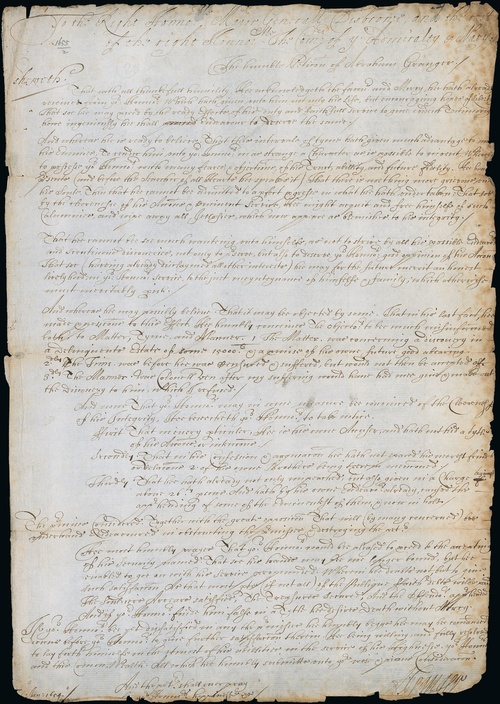
Auction: 18038 - Autographs, Historical Documents, Ephemera and Postal History
Lot: 3037
Autographs
Abraham Granger
1654 (c.) (1 January) petition of Abraham Granger to the Admiralty and Navy Commissioners neatly written on a single sheet of paper with light soiling to the edges and a small repair to the top and bottom left corners. Appears to have been written from confinement. Signed "A Granger". This petition talks of the favour Granger received from the Commissioners, which had given him not only his life but "encourageing hopes of Liberty". Granger then refers to a discovery of a delinquent's estate of £15,000, which he made "before hee was censured & suffered", and the fact that Colonel "Ven after my suffering would have had mee give & make out the discovery to him, which I refused.". He then protests that he has been his own accuser and has not hid any actions, even implicating his nearest friends and relatives, naming two of his own brothers, and "caused the apprehending of some of the Eminentest". He therefore requests his liberty, so that he be "enabled to goe on with his service propounded. Wherein hee doubts not, but to give such satisfacction as that most parte (if not all) of the Publique Faith debts wilbe paid, The Soldiers Arrears satisfied, The Treasures secured; And the offendors apprehended. And if your Honnours finde him false in a Tytle hee desires Death Without Mercy,".
Petitions of this kind rarely bear a signature. Photo
The Calandar of State Papers Domestic (1654-55) documents that Abraham Granger became embroiled in a massive swindle of the public funds of which Granger was found to be a leading figure. Granger had been accused in 1654-55 by Joshua Fugill of counterfeiting warrants and forging the signature of Navy and Admiralty Commissioners on them. Not only this, but Granger was accused of cheating the Commonwealth of £2000 through the manufacturing and vending of false coin. This document illustrates his efforts to free himself from confinement through the offering up of others for accusation and the portrayal of himself as an honest man. Granger's remaining history is uncertain. The last record of him states that he was still in prison 1655 (6 April) but since disapears from the index of the Calandar of State Papers Domestic.
Subject to 20% VAT on Buyer’s Premium. For more information please view Terms and Conditions for Buyers.
Estimate
£150 to £180




